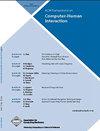Clinician-Facing AI in the Wild: Taking Stock of the Sociotechnical Challenges and Opportunities for HCI
IF 6.6
2区 计算机科学
Q1 COMPUTER SCIENCE, CYBERNETICS
引用次数: 5
Abstract
Artificial Intelligence (AI) in medical applications holds great promise. However, the use of Machine Learning-based (ML) systems in clinical practice is still minimal. It is uniquely difficult to introduce clinician-facing ML-based systems in practice, which has been recognised in HCI and related fields. Recent publications have begun to address the sociotechnical challenges of designing, developing, and successfully deploying clinician-facing ML-based systems. We conducted a qualitative systematic review and provided answers to the question: “How can HCI researchers and practitioners contribute to the successful realisation of ML in medical practice?” We reviewed 25 eligible papers that investigated the real-world clinical implications of concrete clinician-facing ML-based systems. The main contributions of this systematic review are: (1) an overview of the technical aspects of ML innovation and their consequences for HCI researchers and practitioners; (2) a description of the different roles that ML-based systems can take in clinical settings; (3) a conceptualisation of the main activities of medical ML innovation processes; (4) identification of five sociotechnical interdependencies that emerge from medical ML innovation; and (5) implications for HCI researchers and practitioners on how to mitigate the sociotechnical challenges of medical ML innovation.临床医生在野外面对人工智能:评估HCI的社会技术挑战和机遇
人工智能(AI)在医学应用中具有巨大的前景。然而,基于机器学习的(ML)系统在临床实践中的使用仍然很少。在实践中引入面向临床医生的基于ML的系统是非常困难的,这在HCI和相关领域已经得到了认可。最近的出版物已经开始解决设计、开发和成功部署面向临床医生的基于ML的系统的社会技术挑战。我们进行了一项定性系统综述,并回答了以下问题:“HCI研究人员和从业者如何为在医疗实践中成功实现ML做出贡献?”。这篇系统综述的主要贡献是:(1)ML创新的技术方面及其对HCI研究人员和从业者的影响的概述;(2) 基于ML的系统在临床环境中可以扮演的不同角色的描述;(3) 医学ML创新过程的主要活动的概念化;(4) 确定医学ML创新产生的五种社会技术相互依存关系;以及(5)对HCI研究人员和从业者如何缓解医学ML创新的社会技术挑战的影响。
本文章由计算机程序翻译,如有差异,请以英文原文为准。
求助全文
约1分钟内获得全文
求助全文
来源期刊

ACM Transactions on Computer-Human Interaction
工程技术-计算机:控制论
CiteScore
8.50
自引率
5.40%
发文量
94
审稿时长
>12 weeks
期刊介绍:
This ACM Transaction seeks to be the premier archival journal in the multidisciplinary field of human-computer interaction. Since its first issue in March 1994, it has presented work of the highest scientific quality that contributes to the practice in the present and future. The primary emphasis is on results of broad application, but the journal considers original work focused on specific domains, on special requirements, on ethical issues -- the full range of design, development, and use of interactive systems.
 求助内容:
求助内容: 应助结果提醒方式:
应助结果提醒方式:


